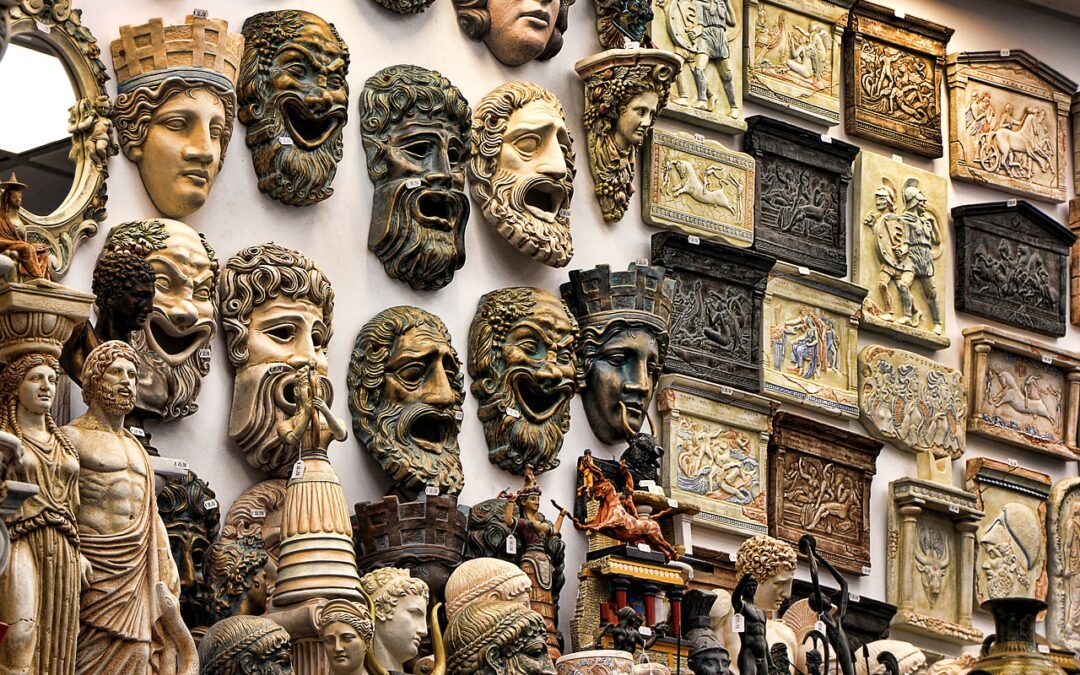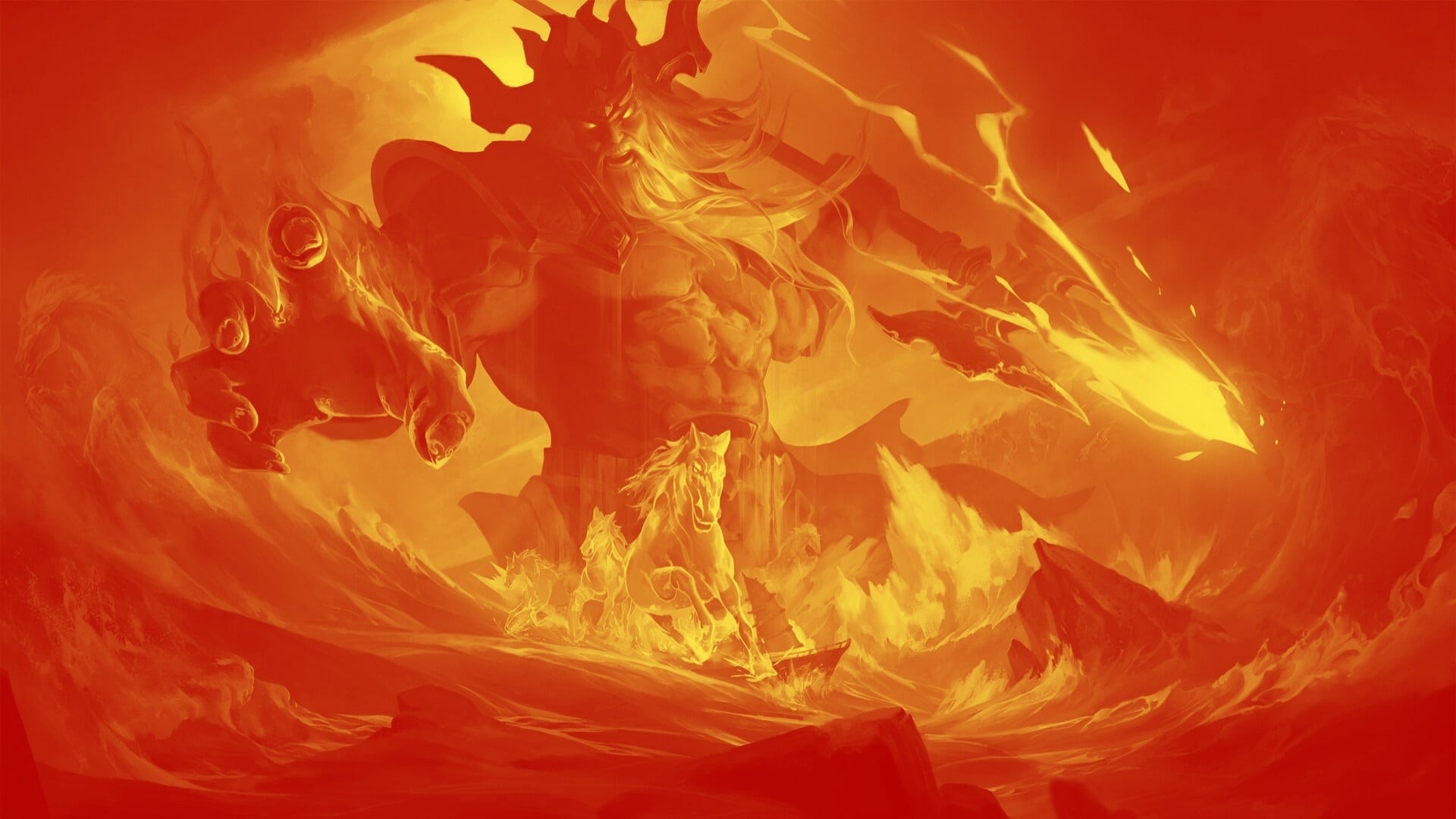People always love to know about Greek gods and goddesses from ancient Greek mythology. Even though they might resemble humans in appearance, every god had a unique power. People admired the strength and stories of these gods. We will introduce you to the top 10 most powerful Greek gods in this article.
1. Zeus
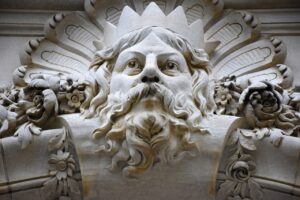 Zeus is the most prominent of all gods in Greek mythology. He commanded and ruled on all universes as the father of all gods. Moreover, he constructed many realms as the personification of the all-natural phenomenon. However, he used hurling thunderbolts at his opponents with a bad temper.
Zeus is the most prominent of all gods in Greek mythology. He commanded and ruled on all universes as the father of all gods. Moreover, he constructed many realms as the personification of the all-natural phenomenon. However, he used hurling thunderbolts at his opponents with a bad temper.
- Supreme ruler of the gods: Zeus is known as the king of the gods in Greek mythology, holding dominion over the sky and thunder, and as a father figure to gods and humans alike.
- Symbol of authority and power: His primary weapon is the thunderbolt, which he uses to enforce his will and punish those who displease him or defy the divine law.
- Guardian of justice and hospitality: Despite his temperamental nature, Zeus is also associated with justice, order, and hospitality, ensuring the protection of guests and the punishment of wrongdoers.
2. Poseidon (God of the Sea)
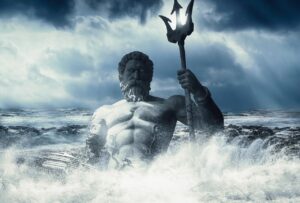 Poseidon was an extraordinarily moody and low-tempered god of Greek history. He was famous as a ruler of the sea. Furthermore, the power of earthquake and storms were in his hands. In fact, for safe passage, sailors relied on him.
Poseidon was an extraordinarily moody and low-tempered god of Greek history. He was famous as a ruler of the sea. Furthermore, the power of earthquake and storms were in his hands. In fact, for safe passage, sailors relied on him.
- Ruler of the seas and oceans: Poseidon governs all bodies of water and is revered for his control over the seas, storms, and earthquakes.
- Protector and threat to sailors: Sailors pray to him for safe passage, yet fear his temper, which can manifest as violent storms or seaquakes.
- Creator of horses: Mythology credits Poseidon with the creation of horses, symbolizing his connection to both the sea and the land.
3. Hades (King of the Underworld/ God of the Dead)
Hades is the 3rd in our list of top 10 most powerful Greek gods in history and Zeus and Poseidon. Definitely, he was the god of the underworld. As a ruler of death, he was unforgiving to those who disobeyed him. Hence, he was the god of the underworld where just death comes.
- Sovereign of the underworld: Hades rules over the realm of the dead, where souls reside after leaving the world of the living.
- Just and stern ruler: While feared, Hades is often depicted as a fair and just ruler, ensuring the proper order and rules of the afterlife are followed.
- Kidnapper of Persephone: One of the most famous myths involving Hades is his abduction of Persephone, leading to the changing seasons as explained by Greek mythology.
4. Prometheus (God of Fire)
Prometheus was the god of fire and was famous as a trickster. As a titan, he gave backfire to humans also civilizes them. Of course, he was a brilliant and well-known forethought.
- Benefactor of mankind: Prometheus is best known for stealing fire from the gods and giving it to humanity, symbolizing the enlightenment and civilization of humankind.
- Symbol of foresight and intelligence: His name itself suggests forethought, representing the use of wisdom and knowledge for progress.
- Punished by Zeus: For his act of defiance, Prometheus was subjected to eternal punishment by Zeus, signifying the gods’ intolerance for insubordination.
5. Dionysus (God of Ecstasy and Wine)
Dionysus created ecstasy and wine and is famous as the god of festivity and pleasure. He was loved by mortals and gods equally. In that case, he brought joy to Greek society.
- Patron of wine, festivity, and ecstasy: Dionysus embodies the spirit of merriment, wine-making, and ecstasy, bringing joy and divine madness to his followers.
- Bringer of agriculture and civilization: Besides pleasure, Dionysus is also associated with the cultivation of vines and the social and cultural aspects of wine consumption.
- Symbol of life’s dual nature: His cult reflects themes of death and rebirth, illustrating the cyclic nature of life and the human connection to the earth.
6. Apollo (God of Poetry, Music, Art, Plague)
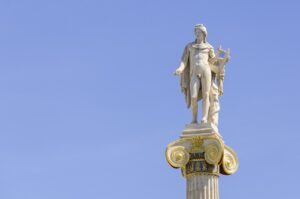 Apollo was famous as the god of music, healing art, and much more. He was one of the sons of Zeus. Apollo ruled over many things, and he was skilled in archery. He provides life and light to the earth.
Apollo was famous as the god of music, healing art, and much more. He was one of the sons of Zeus. Apollo ruled over many things, and he was skilled in archery. He provides life and light to the earth.
- Deity of many domains: Apollo is associated with light, truth, healing, plague, music, poetry, and the arts, showcasing his versatile nature.
- Oracle of Delphi: Apollo’s most famous sanctuary was at Delphi, home to his oracle, which was considered the most accurate and was sought after for divine guidance.
- Sun god: Although Helios is often identified as the sun god, Apollo is also connected to the sun, symbolizing light, clarity, and reason.
7. Morpheus (God of Dreams)
Morpheus is famous as the god of dreams and sleep. He had the power to sleep, anyone. He could come in dreams of anyone. However, he had all control over anyone’s imagination. But he was less famous among all other gods.
- Master of dreams: Morpheus has the ability to appear in dreams in any form, influencing the dreamscapes of mortals.
- Messenger of the gods: Through dreams, Morpheus can send messages and warnings from the gods to the living.
- Son of Hypnos: As a son of Hypnos, the god of sleep, Morpheus’s role in influencing dreams underscores the importance of dreams in understanding divine will and the subconscious.
8. Ares (God of War)
He was known as the god of war. However, he was not very famous among gods and mortals because of his violent nature. His imprudence always led his parents down.
- Embodiment of war’s brutality: Ares represents the violent and physical aspects of war, in contrast to Athena, who symbolizes strategy and warfare’s intellectual aspects.
- Unpopular among gods and humans: Due to his aggressive and tumultuous nature, Ares is not well-loved among both gods and mortals.
- Father of several warriors and heroes: Despite his reputation, Ares fathered numerous offspring who became famous warriors and heroes, embedding his legacy in Greek heroic tales.
9. Hephaestus (God of Fire and Metalworking)
Hephaestus was a petty god among all others. He was unique from the rest of the other gods as he was an ugly god. Indeed, he was a very polite, kind, and peace-loving ruler. He made divine weapons and invented different metal things for his brother.
- Craftsman of the gods: Hephaestus is celebrated for his incredible skill in metalworking, creating magnificent weapons and armor for the gods.
- Symbol of craftsmanship and ingenuity: His creations, including the shield of Achilles and the chains of Prometheus, demonstrate his unparalleled craftsmanship and inventive genius.
- Overcoming adversity: Despite being cast out of Olympus because of his appearance, Hephaestus’s tale is one of resilience, focusing on his talents and contributions to the gods and humanity.
10. Hermes (God of Commerce)
He was a bridge between gods and mortals. He was a god’s manager to move between human and god’s realms. In that case, he was a protector of athletes and travelers. He was not a dangerous god.
- Messenger of the gods: Hermes is renowned for his speed and wit, acting as the messenger between the gods and between gods and humans.
- Patron of boundaries and travelers: He protects and guides travelers and is involved in all kinds of exchanges, including commercial and the transmission of information.
- Inventor and guide to the underworld: Hermes is credited with inventing various arts, including music and gymnastics, and serves as a guide for souls to the underworld, showcasing his versatile roles in Greek mythology.

